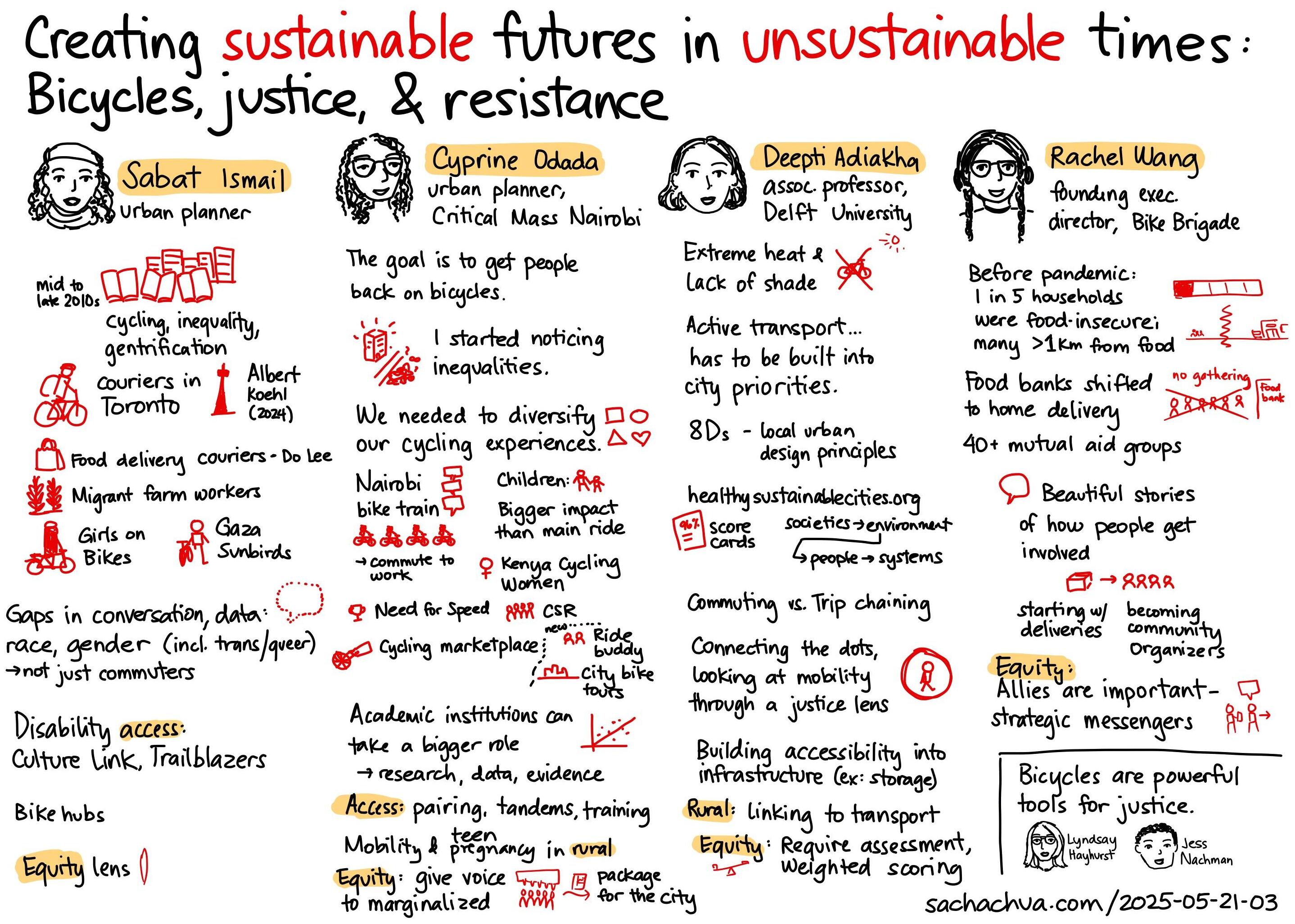Creating sustainable futures in unsustainable times: Bicycles, justice, and resistance - Sabat Ismail, Cyprine Odada, Deepti Adlakha, Rachel Wang
Posted: - Modified: | sketchnotes, biking, life: Updated links for Cyprine Odada and Rachel Wang.
W- has been volunteering for Bike Brigade for a number of months now. A+ and I occasionally tag along. It's encouraging to be part of this initiative to deliver groceries and other essentials to people who need help. One of the organizers spoke at this panel discussion about bicycles and social justice organized by York University.
Session description
Bicycles hold immense potential for addressing today’s pressing social and climate justice challenges. However, coordinating and sustaining grassroots cycling movements remains difficult, especially as global development aid for climate action and broader humanitarian work rapidly declines. Indeed, we are living in a moment of profound global injustice, where imperialism, colonial violence, and systemic oppression dictate whose struggles and resistances are recognized. In this context, grassroots organizing and local self-determination have become more pressing than ever. This webinar explores how bicycling serves as a tool for justice, sustainability, and collective resistance. Indeed, we see bicycling/mobility justice in responding to uncertain global contexts, including a rise in right-wing fascist governments, climate change and its unequal effects on vulnerable communities, and an escalation on anti-immigrant policies and sentiments. Those most affected – racialized, Indigenous, low-income, and gender-diverse communities – are leading powerful mobility justice movements. They are reclaiming space, resisting exclusion, and challenging systemic inequalities through cycling activism. Speakers will share insights from different regions, highlighting how bicycles are more than transportation – they are a means of survival, self-determination, and community care. This conversation will thus bring together activists, researchers, and practitioners striving to make transportation more accessible and equitable.
Panelists:
- Dr. Deepti Adlakha (Associate Professor, Delft University of Technology)
- Sabat Ismail (urban planner, multi-disciplinary artist, and writer)
- Cyprine Odada (urban planner, cycling advocate, Founder of Women Shaping Cities)
- Rachel Wang (Founding Executive Director, The Bike Brigade – Toronto; environmental practitioner and community organizer)
Here are the notes I took:
Text and links from sketch
Creating sustainable futures in unsustainable times: Bicycles, justice, & resistance
- Sabat Ismail: urban planner
- Mid to late 2010s: books on cycling, inequality, gentrification
- Couriers in Toronto, Albert Koehl (2024)
- Food delivery couriers - Do Lee
- Migrant farm workers
- Girls on Bikes
- Gaza Sunbirds
- Gaps in conversation, data: race, gender (incl. trans/queer) - not just commuters
- Disability access: CultureLink, Trailblazers
- Bike hubs
- Equity lens
- Cyprine Odada: urban planner, Critical Mass Nairobi
- The goal is to get people back on bicycles.
- I started noticing inequalities.
- We needed to diversify our cycling experiences.
- Nairobi bike train: Commute to work
- Children: Bigger impact than main ride
- Kenya Cycling Women
- Need for Speed
- Cycling marketplace
- CSR
- New:
- ride buddy
- city bike tours
- Access: pairing, tandems, training
- Teen mobility & pregnancy in rural
- Equity: give voice to marginalized, package for the city
- Deepti Adlakha: assoc. professor, Delft University of Technology
- Extreme heat & lack of shade
- Active transport… has to be built into city priorities.
- 8 Ds: local urban design principles
- healthysustainablecities.org
- societies, environment, people, systems
- Score cards
- commuting vs. trip chaining
- connecting the dots, looking at mobility through a justice lens
- Academic institutions can take a bigger role: research, data, evidence
- Building accessibility into infrastructure (ex: storage)
- Rural: Linking to transport
- Equity: Require assessment, weighted scoring
- Rachel Wang: founding exec. director, Bike Brigade
- Before pandemic: 1 in 5 households were food insecure; many >1km from food
- Food banks shifted to home delivery (no gathering in lines)
- 40+ mutual aid groups
- Beautiful stories of how people get involved: starting w/ deliveries, becoming community organizers
- Equity: Allies are important - strategic messengers
- Lyndsay Hayhurst, Jess Nachman
- Bicycles are powerful tools for justice.
Feel free to share or remix this under the Creative Commons Attribution License.
I like that so many people are thinking about this from different perspectives around the world: from the ground up with the experiences of people who are out there, to groups like Critical Mass Nairobi and Bike Brigade where people can work together to make things better, to academics and urban planners who can think about how systems are designed.
We probably lean more towards the very small scale end of things, for now: whatever little deliveries we can squeeze into our schedule. A+ is particularly proud of putting things in her own basket and also hauling a full bag of groceries once we get to the recipient's building. Who knows, maybe we'll find ourselves moving along that pipeline from volunteer grocery deliveries to community organizing…
Anyway, I don't know if a recording will get posted, but if I come across one, I'll update this.

